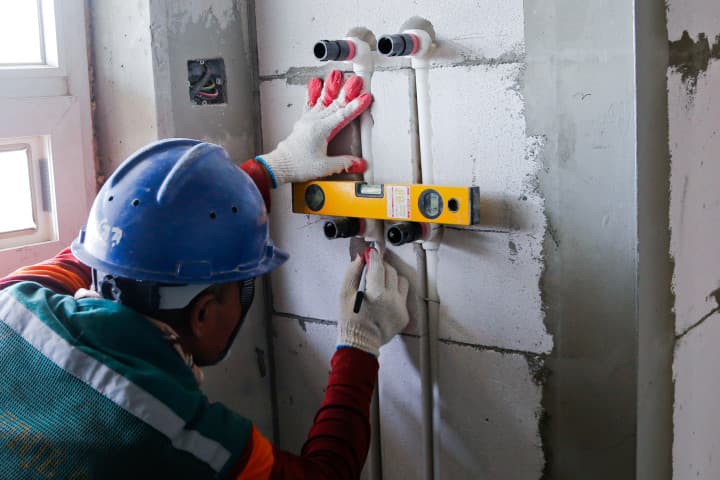Skilled trades are often overlooked when it comes to career advancement, but the truth is that there are plenty of opportunities for growth and success in the trades. This article explores three specific examples of what career advancement can look like in skilled trades.
Hard work and dedication can lead to a prosperous and fulfilling career with high job security and above-average wages. When people think of career advancement, they often envision climbing the corporate ladder in a traditional office setting.
But there are many success stories in skilled trades that showcase the potential for growth and advancement in these industries. From starting as an apprentice to becoming a master craftsman or starting your own business, there are many ways to build a successful and rewarding career in skilled trades.
What are skilled trades?
Skilled trades typically refer to occupations that involve working with your hands to help create, maintain, or repair society's infrastructure.
Some common examples of skilled trades include construction workers, electricians, plumbers, carpenters, welders, HVAC technicians, and automotive technicians. These trades are essential for keeping modern society running.
Unlike many office jobs, skilled trades often do not require a traditional college degree. They do however require a combination of classroom instruction and hands-on training. Apprenticeships are the standard way to enter the skilled trades, as they provide both on-the-job training and classroom instruction.
One of the advantages of pursuing a career in skilled trades is the high demand for these skills. As infrastructure ages and technology advances, there is a continuous need for skilled tradespeople to repair, maintain, and upgrade various systems. This demand often leads to job security and competitive wages in the skilled trades.
Example 1: Plumber from apprentice to master
One common example of a lucrative career in skilled trades is the journey of a plumber from apprentice to master. Becoming a plumber typically starts with an apprenticeship program, where individuals learn the trade under the guidance of experienced plumbers.
As a beginner the apprentice gains hands-on experience, learns industry-specific skills, and completes classroom instruction. As they progress, they take on more complex projects, gain knowledge of plumbing codes and regulations, and develop problem-solving abilities.

After completing the apprenticeship program and gaining a certain number of hours of on-the-job training, the apprentice can apply for a journeyman plumber license. This allows them to work independently but under the supervision of a master plumber.
Becoming a master plumber opens doors to higher-paying job opportunities, the ability to work on more complex projects, and the potential to start their own plumbing business. Master plumbers often have the knowledge and expertise to oversee teams of plumbers, manage projects, and ensure compliance with plumbing codes.
In addition to traditional career advancement, skilled trades such as plumbing offer opportunities for specialization and diversification. A plumber can choose to focus on specific areas such as residential or commercial plumbing, or they can expand their skills to include related trades like HVAC or pipefitting.
Example 2: Electrician from apprentice to master
During the apprenticeship, electricians learn about electrical systems, wiring, circuitry, safety protocols, and more. They also gain practical experience by assisting in various electrical projects and installations. This hands-on training allows apprentices to develop their skills and learn from experienced professionals.
After completing the apprenticeship, electricians can become journeymen, which means they are fully qualified to work independently. At this stage, they have acquired the necessary experience and knowledge to take on complex electrical projects.

Electricians with ambition and drive can continue their career advancement by pursuing additional certifications and licenses. These certifications can include specialized training in areas such as industrial electrical work, green energy systems, or advanced automation.
With each new certification and skill acquired, electricians open doors to new opportunities and higher-paying jobs. They can take on leadership roles, become project managers, or even start their own electrical contracting businesses. The possibilities for career advancement in the electrical field are vast.
In addition to professional growth, electricians also enjoy job security and above-average wages. Skilled trades such as electrical work are in high demand, and there is a shortage of qualified professionals. This means that electricians can enjoy a stable and prosperous career with plenty of job opportunities.
Example 3: Welder from apprentice to master
In the welding industry, apprenticeships typically last 48 months and require learning a range of manual skills and best practices for safety. Apprentices work under the guidance of experienced welders, learning the skills and techniques necessary for the trade.
As they gain more experience and demonstrate their abilities, apprentices can take on more complex projects and responsibilities.
After completing their apprenticeship, welders can become journeyman welders, which is a recognized level of proficiency in the trade. Journeymen welders are competent in various welding processes and can work independently on a wide range of projects.

To become a master welder, one must continue to learn and refine their craft. This can involve pursuing additional certifications, attending advanced training programs, or gaining specialized knowledge in specific welding techniques or industries. Master welders are highly skilled professionals who have extensive experience and expertise in the field.
Career advancement for welders can also involve moving into leadership positions, such as becoming a welding supervisor or foreman. These roles involve overseeing and coordinating welding projects, managing a team of welders, and ensuring quality and safety standards are met.
Many welders choose to start their own businesses and become entrepreneurs. They can offer welding services to clients and take on projects independently or hire and manage a team of welders.
Skilled trades provide a clear path for career advancement
Skilled trades offer a unique and rewarding career path that often goes overlooked. From apprenticeships to entrepreneurship, there are numerous opportunities for growth and success in these industries.
By committing to hard work and dedication, individuals can achieve high job security, above-average wages, and a fulfilling career. It's important to recognize the potential for career advancement in skilled trades and encourage others to consider these industries as viable options for their future.
Ready to start or grow your career in the skilled trades? Sign up for a free SkillHero account to get access to all of our career-building resources and tools.

